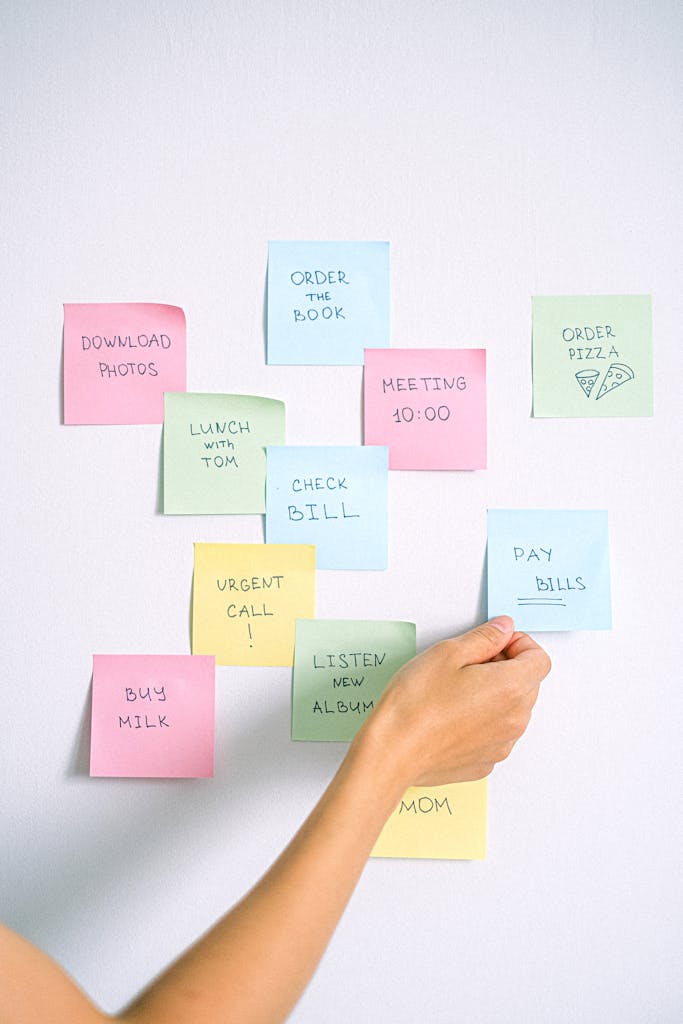
You’ve likely beaten yourself up countless times for being “lazy,” but what if I told you that your struggle to get things done might actually be your brain working differently? I’ve noticed that many people, myself included, spend years thinking we’re just unmotivated slackers when there’s actually something much more complex happening behind the scenes. The truth is, what looks like laziness on the surface often masks a neurological difference that affects how you process tasks, manage time, and maintain focus—and recognizing these patterns could completely change how you understand yourself.
Key Takeaways
- You feel mentally exhausted despite accomplishing little, with racing thoughts but sluggish physical responses creating a mind-body disconnect.
- Simple tasks like washing dishes feel overwhelming and impossible to start, causing paralysis even with basic daily activities.
- You hyperfocus intensely on interesting activities while completely avoiding important but boring responsibilities like paying bills or paperwork.
- Time feels distorted – you consistently misjudge how long tasks take and lose track of time during activities.
- You start multiple exciting projects but rarely finish them, seeking novelty’s dopamine rush over completing routine work.
You Feel Paralyzed When Starting Tasks, Even Simple Ones
When you find yourself staring at your dirty dishes for the third day in a row, knowing they’ll take maybe ten minutes to wash but feeling like you’re facing Mount Everest instead of a sink full of plates, you’re experiencing what many people mistake for pure laziness.
I’ve noticed this paralysis hits hardest with tasks that seem ridiculously simple, like folding laundry or responding to a text message. Your brain literally freezes, and you can’t figure out where to start, even though you know exactly what needs doing.
In my experience, this isn’t about lacking motivation or being lazy—it’s your ADHD brain struggling with task initiation, which requires executive function skills that don’t always cooperate when you need them most.
Breaking overwhelming tasks into smaller, manageable areas can help overcome this paralysis by creating achievable victories that build momentum instead of triggering your brain’s freeze response.
Your Mind Races But Your Body Won’t Move
While your thoughts bounce around like a pinball machine at maximum tilt, your body feels like it’s been superglued to the couch, creating this bizarre disconnect that makes you feel simultaneously wired and completely stuck.
I’ve noticed this mental-physical split happens most when I’m overwhelmed by options or facing something that requires sustained focus. Your brain generates a million ideas, solutions, and worries, but translating that mental energy into physical action feels impossible.
| Mental State | Physical Response | Common Triggers |
|---|---|---|
| Racing thoughts | Heavy limbs | Work deadlines |
| Restless mind | Frozen posture | Creative projects |
| Anxious planning | Sluggish movement | Social obligations |
| Hyperactive ideas | Procrastination behaviors | Administrative tasks |
| Overthinking loops | Complete inertia | Decision-making moments |
This constant mental chatter can leave you feeling mentally exhausted even when you haven’t physically accomplished anything, making the paralysis feel even more frustrating.
In my experience, this isn’t laziness—it’s your ADHD brain struggling to bridge the gap between intention and execution.
You Hyperfocus on Interesting Things While Ignoring Important Ones

This mind-body disconnect often leads to another telltale ADHD pattern that people mistake for laziness: you’ll spend six hours researching the perfect houseplant care routine while your actual bills sit unopened on the kitchen counter.
I’ve noticed this hyperfocus phenomenon hits hardest when something genuinely captures your interest, and suddenly you’re an expert on medieval armor construction while your laundry grows its own ecosystem. In my experience, you’re not being lazy when you ignore “boring” tasks, you’re experiencing executive dysfunction that makes switching between interesting and necessary feel impossible.
Your brain craves dopamine-rich activities, so researching vintage guitar amplifiers feels effortless while organizing your taxes feels like climbing Mount Everest in flip-flops. The key to managing this pattern is learning to prioritize tasks effectively by identifying which responsibilities truly need immediate attention versus those that can wait, helping you channel your hyperfocus more strategically.
Time Feels Like an Abstract Concept You Can’t Grasp
Most people with ADHD discover that time operates by completely different rules in their world, and you’ll find yourself consistently baffled by how “just five more minutes” somehow transforms into three hours of lost productivity.
I’ve noticed that estimating how long tasks will take becomes this weird guessing game where you’re either wildly optimistic or completely terrified of commitment. You’ll think organizing your desk drawer takes twenty minutes, then suddenly it’s midnight and you’re still sorting through random cables from 2015.
In my experience, using visual timers like the Time Timer or your phone’s built-in timer helps create that concrete boundary your brain desperately needs, turning abstract time into something you can actually see disappearing.
This time confusion often stems from an irregular circadian rhythm, which is why establishing consistent daily routines becomes absolutely crucial for managing ADHD symptoms and regaining some control over your relationship with time.
You Start Multiple Projects But Rarely Finish Them
You know that feeling when you’ve got seventeen half-finished craft projects scattered around your house, three abandoned novels saved on your laptop, and a garden that’s somehow both overgrown and completely neglected at the same time? I’ve noticed this pattern in my own life where I’ll get incredibly excited about learning pottery or reorganizing my entire closet system, but then lose steam about halfway through when the initial rush of starting something new wears off.
In my experience, what looks like chronic laziness or lack of commitment is actually your ADHD brain craving that sweet dopamine hit from novelty, struggling with executive function when tasks become routine, and operating on an interest-based motivation system that doesn’t care about your Pinterest board full of “projects to complete.” Breaking down larger tasks into smaller, more manageable steps can help you push through that middle phase where executive function typically falters and you’re most likely to abandon the project entirely.
The Novelty Dopamine Hit

When that spark of excitement hits and you’re suddenly convinced that *this* is the project that’ll finally stick, your brain gets flooded with dopamine from the sheer novelty of starting something new—but I’ve noticed that maintaining that same enthusiasm once the initial thrill wears off becomes nearly impossible for those of us with ADHD.
In my experience, we’re fundamentally chasing that first hit of excitement, which explains why you might’ve seventeen half-finished craft projects, three abandoned novels, and countless business ideas documented in random notebooks. The dopamine rush from novelty is intoxicating, but when routine sets in and the project requires sustained focus rather than creative bursts, your brain literally loses interest because it’s no longer getting that neurochemical reward.
Executive Function Breakdown
Breaking down what’s actually happening in your brain reveals that this isn’t about laziness at all—it’s about executive function, which I’ve learned is fundamentally your brain’s project manager that’s supposed to help you plan, prioritize, and see tasks through to completion.
In my experience, ADHD brains struggle with this mental coordination, which explains why you might start reorganizing your entire closet, painting a room, and learning Spanish all in the same week, then abandon each project at 70% completion.
I’ve noticed that neurotypical people can naturally sequence tasks and maintain focus until finished, but our brains jump to the next shiny opportunity before wrapping up the current one, leaving behind a trail of half-finished brilliance that looks like laziness to others.
Interest-Based Motivation System
Most people with ADHD operate on what I call an “interest-based motivation system,” which means we’re fundamentally, chiefly, or primarily powered by novelty, passion, and curiosity rather than the traditional willpower-and-discipline engine that neurotypical brains rely on.
I’ve noticed this creates a predictable pattern where you start projects when they’re exciting, then abandon them once the novelty wears off. In my experience, this isn’t laziness—it’s how your brain literally functions.
- You have dozens of half-finished craft projects gathering dust in closets
- Your browser has 47 tabs open for different “life-changing” ideas you discovered
- You’ve started learning three languages on Duolingo but mastered none
- Your garage contains exercise equipment from five different fitness phases
- You enthusiastically research hobbies for hours, then never actually start them
Small Tasks Feel Overwhelming and Exhausting

Although loading the dishwasher might seem like a five-minute task to neurotypical brains, I’ve noticed that my ADHD mind turns it into an elaborate mental obstacle course that leaves me feeling like I’ve just completed a triathlon.
You’ll find yourself standing in the kitchen, mentally calculating every step: rinse the plates, check if they’re too dirty, decide which rack works best, figure out the preferred loading pattern, recall to add detergent, select the right cycle.
I’ve discovered that what others see as simple chores become multi-layered puzzles that drain your mental energy before you even begin. In my experience, this executive function overload explains why folding laundry or organizing your desk can feel more exhausting than running a marathon.
Consider doing an energy audit to track how different tasks affect your physical energy, mental clarity, and mood throughout the day.
You Work Best Under Extreme Pressure or Tight Deadlines
If you’ve ever noticed that you suddenly become a productivity powerhouse when a deadline is breathing down your neck, you’re experiencing how ADHD brains often need that shot of adrenaline to kickstart focus and motivation.
I’ve found that what others might call “procrastination” is actually my brain’s way of creating the perfect storm of urgency, because without that pressure-cooker environment, I’ll sit there staring at my computer screen like it’s written in ancient hieroglyphics.
In my experience, those calm, “plenty of time” periods can feel like mental quicksand where every small task seems impossible, but give me three hours to finish a project that should take three days, and suddenly I’m firing on all cylinders.
This ability to perform amazingly under pressure is actually one of the ADHD superpowers that can be incredibly valuable once you learn to work with it rather than against it.
Adrenaline Fuels Your Focus
You know that magical moment when you suddenly kick into high gear with just hours left before a deadline, and somehow you’re cranking out your best work while everyone else would be having a meltdown? That’s your ADHD brain literally getting high off stress hormones, and I’ve noticed it’s like having a superpower with a very specific activation button.
Your adrenaline-fueled focus might show up as:
- Pulling all-nighters that produce your most creative breakthroughs
- Needing coffee shop chaos or background noise to concentrate
- Feeling energized by crisis situations while others feel overwhelmed
- Finding boring tasks impossible until they become urgent emergencies
- Thriving during live presentations, debates, or high-stakes meetings
In my experience, this isn’t laziness—it’s your brain demanding the neurochemical equivalent of rocket fuel to function ideally.
Procrastination Creates Necessary Urgency

Most people think procrastination is a character flaw, but I’ve discovered it’s actually my ADHD brain’s way of manufacturing the exact conditions it needs to perform at peak capacity.
You know that feeling when you’ve got three hours until a deadline and suddenly your brain becomes a laser-focused machine? That’s not coincidence, that’s your ADHD brain finally getting the urgency it craves.
I’ve noticed I can spend weeks avoiding a project, then knock it out brilliantly in one intense session because the pressure creates the dopamine surge I need. In my experience, fighting this pattern is exhausting, but understanding it gives you power to work with your brain instead of against it.
Calm Periods Equal Paralysis
Taking this concept one step further, I’ve realized that when life gets too peaceful, my ADHD brain fundamentally shuts down and enters what I call “executive function hibernation mode.” During calm periods when there’s no looming crisis or impossible deadline breathing down my neck, I find myself staring at my to-do list like it’s written in ancient hieroglyphics, completely unable to tackle even the simplest tasks that would normally take me five minutes to complete.
In my experience, this paralysis manifests in several predictable ways:
- You’ll reorganize your entire workspace instead of starting actual work
- Simple emails sit in your drafts folder for weeks
- You’ll research productivity apps for hours rather than being productive
- Netflix becomes mysteriously more appealing than pursuing your goals
- You’ll create elaborate planning systems that you never actually use
Your Energy Levels Are Unpredictable and Inconsistent
The unpredictability of ADHD energy feels like riding an emotional rollercoaster that someone else is operating, and I’ve noticed it’s one of the most misunderstood aspects of this condition because people assume you’re just being inconsistent or unreliable.
In my experience, you might wake up one morning feeling like you could reorganize your entire house, tackle three work projects, and still have energy for evening plans, only to crash completely by noon and struggle to make basic decisions.
I’ve found that explaining this pattern to others helps them understand why you can’t simply “push through” exhaustion the way neurotypical people might, because your brain’s energy regulation system operates differently, making it nearly impossible to predict when you’ll feel motivated versus completely drained.
These energy fluctuations are directly linked to dopamine imbalances in the ADHD brain, which affect motivation and reward processing in ways that create these dramatic shifts between high productivity and complete exhaustion.
You Avoid Tasks That Require Sustained Mental Effort

In my experience, you’ll find yourself mysteriously drawn to reorganizing your desk drawer or scrolling through social media whenever a project requires deep thinking, because your brain seems to hit an invisible wall when faced with tasks that demand sustained focus.
I’ve noticed that what starts as a simple report or assignment quickly transforms into this overwhelming mountain of complexity, and suddenly you’re convinced that watching YouTube videos about productivity is more productive than actually being productive.
You’ll tell yourself you’re just taking a quick break to “recharge,” but honestly, we both know that’s just your brain’s sneaky way of avoiding the mental marathon ahead, because maintaining concentration for extended periods feels like trying to sprint while wearing cement boots.
The truth is, this avoidance pattern often stems from feeling overwhelmed, which is one of the key mental causes that can make us feel stuck and unmotivated in the first place.
Mental Fatigue Sets In
Seven hours into what should’ve been a two-hour work session, you’re still staring at that spreadsheet like it’s written in hieroglyphics, and I’ve been there more times than I care to admit. Mental fatigue with ADHD isn’t the same as regular tiredness, it’s like your brain’s processing power just hits a wall and refuses to cooperate.
I’ve noticed this exhaustion shows up in predictable ways:
- Your eyes glaze over mid-sentence while reading important emails
- Simple decisions like choosing lunch suddenly feel overwhelming
- You reread the same paragraph five times without absorbing anything
- Your normally sharp wit becomes as dull as a butter knife
- Even switching between browser tabs requires Herculean effort
In my experience, this isn’t laziness, it’s your ADHD brain desperately needing a reset.
Complex Tasks Feel Overwhelming
When facing a tax return or assembling that IKEA bookshelf that’s been sitting in its box for three months, your brain practically stages a revolt, and I’ve learned this avoidance isn’t about being lazy—it’s about how ADHD brains process complex, multi-step tasks.
I’ve noticed that when you look at something requiring sustained mental effort, like filing insurance claims or learning QuickBooks, your mind immediately calculates the cognitive load and fundamentally says “nope.”
In my experience, this happens because ADHD brains struggle with executive function—the mental organizing system that breaks big tasks into manageable chunks. You’re not avoiding work because you’re unmotivated; you’re protecting yourself from cognitive overload, which actually shows impressive self-awareness about your mental capacity.
Procrastination Becomes Default Response
While complex tasks make your brain revolt, procrastination takes this avoidance and turns it into your brain’s go-to strategy for anything requiring sustained mental effort, and I’ve discovered this isn’t the moral failing society makes it out to be—it’s actually your ADHD brain’s protective mechanism kicking into overdrive.
I’ve noticed that procrastination becomes your default response when you’re facing tasks that drain your already limited dopamine reserves:
- You’ll clean your entire house before starting that important report
- Social media scrolling replaces actual work for hours
- You convince yourself you work better under pressure
- Simple tasks get delayed until they become urgent crises
- You feel guilty about procrastinating, which makes you procrastinate more
In my experience, this pattern reveals your brain desperately seeking easier dopamine hits.
You Feel Restless Even When You’re “Being Lazy”
Although you’re sprawled across your couch in what looks like peak laziness mode, your mind feels like it’s running a marathon while your body fidgets with restless energy that just won’t quit. I’ve noticed this paradox happens when your ADHD brain craves stimulation but can’t focus enough to actually do anything productive.
| What You Feel | What Others See | What’s Really Happening |
|---|---|---|
| Mind racing constantly | Lounging around lazily | Understimulation seeking activity |
| Physical restlessness | Procrastinating on purpose | Executive dysfunction blocking action |
| Frustrated energy buildup | Choosing to be unproductive | Dopamine-seeking behavior loop |
In my experience, this restless “laziness” signals your brain needs the right kind of stimulation, not forced productivity, which explains why scrolling TikTok feels easier than tackling your to-do list. The constant digital notifications from your phone provide the instant gratification your ADHD brain seeks, while important tasks feel overwhelming without that immediate dopamine hit.
Your Motivation Comes in Intense Bursts Followed by Complete Crashes
One minute you’re conquering the world with superhuman energy, reorganizing your entire closet at 2 AM and planning to learn French by Thursday, but then you crash harder than a phone with 1% battery and can’t even muster the strength to make toast for three days straight.
I’ve noticed this pattern creates a vicious cycle where you beat yourself up during the crash phase, thinking you’re just lazy when you’re actually experiencing ADHD’s classic dopamine rollercoaster.
- You start twelve projects during your “productive” phase but finish zero
- You feel invincible at 11 PM, then completely depleted by noon the next day
- Simple tasks like laundry become impossible during crash periods
- You oscillate between feeling like a productivity guru and a complete failure
- Your energy levels don’t match normal human patterns or schedules
You Experience Shame and Self-Criticism About Your Productivity
This boom-bust cycle feeds directly into what I’ve found to be one of the most damaging aspects of undiagnosed ADHD: the crushing weight of shame that settles on your shoulders like a lead blanket every time you “fail” to be productive.
You’re constantly comparing yourself to neurotypical standards, beating yourself up for not maintaining consistent output like your colleagues who seem to effortlessly tackle their to-do lists day after day. I’ve noticed this creates a vicious cycle where shame actually makes productivity harder, because you’re spending mental energy on self-criticism instead of focusing on tasks.
In my experience, you might catch yourself thinking “I’m so lazy” or “Why can’t I just get it together?” when the real issue isn’t character flaws—it’s brain wiring.
Conclusion
If you’re recognizing yourself in these signs, I’ve noticed it’s incredibly freeing to understand that your struggles aren’t character flaws, they’re neurological differences that deserve compassion rather than criticism. In my experience, the next step isn’t self-diagnosis, but having an honest conversation with a healthcare professional who can help you develop strategies that actually work with your brain, not against it.




